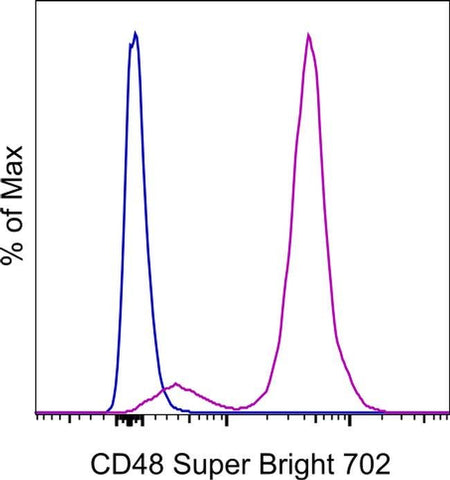
CD48 Monoclonal Antibody (HM48-1), Super Bright™ 702, eBioscience™
View Cart or Continue shopping.
Description
PRODUCT DETAILS
Host: Armenian Hamster
Isotype: IgG
Clonality: Monoclonal
Clone: HM48-1
Format: Super Bright™ 702
Reactivity: Mouse
Application: Flow Cytometry
Tested Dilution: 1.0 µg/test
Concentration: 0.2 mg/mL
Storage: 4° C, store in dark, DO NOT FREEZE!
Formulation: PBS, pH 7.2, containing 0.09% sodium azide
Purification: Affinity chromatography
Data Sheet: TDS
Specific Information
Description: The HM48-1 monoclonal antibody reacts with the mouse CD48 antigen; also known as BCM1, Blast-1 (human), and OX-45 (rat). CD48, a member of the SLAM family and Ig superfamily, is a 45 kDa GPI-linked glycoprotein expressed on the majority of hematopoietic cells. Recent publications have reported differential expression of members of the SLAM family including CD48, CD150, and CD244 among functionally distinct bone marrow hematopoietic progenitors providing a useful tool for prediction of the primitiveness of hematopoietic progenitors based on the expression of these SLAM family members. Hematopoietic stem cells (HSC) are highly purified as CD150(+)CD244(-)CD48(-) cells while non-self-renewing multipotent hematopoietic progenitors (MPP) are CD244(+)CD150(-)CD48(-) and the most restricted progenitors are CD48(+)CD244(+)CD150(-). CD48 plays a critical role in adhesion and T cell activation. In the mouse, the primary counter-receptors for CD48 are CD2 and CD244. HM48-1 is reported to modulate in vitro and in vivo CD48 functions including blocking the CD48/CD2 and CD48/CD244 interactions, inhibiting the proliferative response of mitogen-activated spleen cells, providing a costimulation signal for T cells activated in vitro through their TCR, and prolonging cardiac allograft survival in vivo.
Applications Reported: This HM48-1 antibody has been reported for use in flow cytometric analysis.
Applications Tested: This HM48-1 antibody has been tested by flow cytometric analysis of mouse splenocytes. This can be used at less than or equal to 1.0 µg per test. A test is defined as the amount (µg) of antibody that will stain a cell sample in a final volume of 100 µL. Cell number should be determined empirically but can range from 10^5 to 10^8 cells/test. It is recommended that the antibody be carefully titrated for optimal performance in the assay of interest.
Super Bright 702 is a tandem dye that can be excited with the violet laser line (405 nm) and emits at 702 nm. We recommend using a 710/50 bandpass filter. Please make sure that your instrument is capable of detecting this fluorochrome.
When using two or more Super Bright dye-conjugated antibodies in a staining panel, it is recommended to use Super Bright Complete Staining Buffer (Product # SB-4401) to minimize any non-specific polymer interactions. Please refer to the datasheet for Super Bright Staining Buffer for more information.
Light sensitivity: This tandem dye is sensitive to photo-induced oxidation. Please protect this vial and stained samples from light.
Fixation: Samples can be stored in IC Fixation Buffer (Product # 00-8222) (100 µL of cell sample + 100 µL of IC Fixation Buffer) or 1-step Fix/Lyse Solution (Product # 00-5333) for up to 3 days in the dark at 4°C with minimal impact on brightness and FRET efficiency/compensation. Some generalizations regarding fluorophore performance after fixation can be made, but clone specific performance should be determined empirically.
Excitation: 405 nm; Emission: 702 nm; Laser: Violet Laser
Super Bright Polymer Dyes are sold under license from Becton, Dickinson and Company.
For Research Use Only. Not for use in diagnostic procedures. Not for resale without express authorization.
